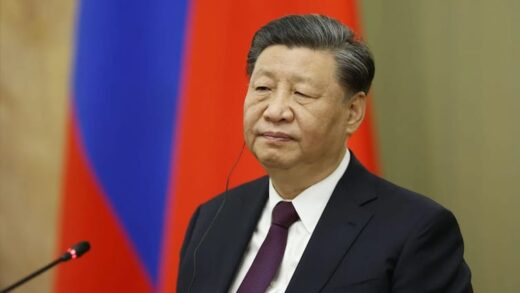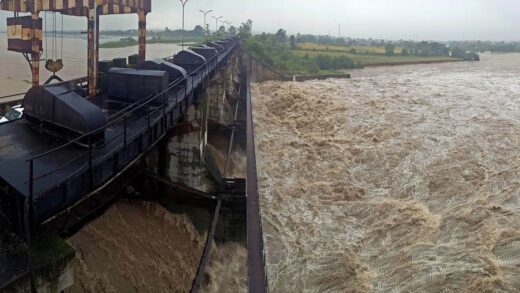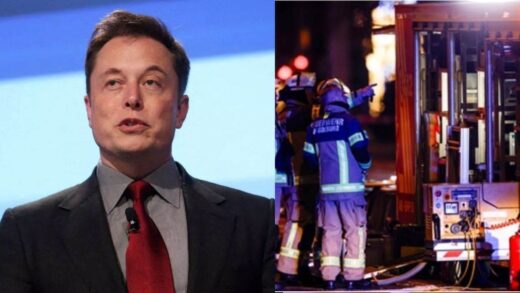SYDNEY & NUKU’ALOFA, Aug 30 (IPS) – Three months ahead of the COP29 United Nations (UN) Climate Change Conference, the United Nations Secretary-General, António Guterres, has called for an emergency response from the international community as new data from the World Meteorological Organization (WMO) reveals a critical deterioration in the state of the climate.
Scientists have called for limiting the global temperature rise to 1.5 degrees Celsius above pre-industrial levels to prevent overheating of the atmosphere and a damaging rise in sea levels. But, due to inaction on reducing greenhouse gas emissions, there is an 80 percent chance that the 1.5 degree threshold will be breached within the next five years, reports the WMO.
“This is a crazy situation: rising seas are a crisis entirely of humanity’s making. A crisis that will soon swell to an almost unimaginable scale with no lifeboat to take us back to safety,” the UN Secretary-General declared in Nuku’alofa, the capital of Tonga, a Polynesian nation of about 106,000 people located southeast of Fiji, on Monday.
He has been on the ground in the Pacific Islands, witnessing firsthand how people’s lives are hanging in the balance as they suffer a relentless battering of climate extremes, such as cyclones, floods, rising seas and hotter temperatures.
“Today’s reports confirm that relative sea levels in the southwestern Pacific have risen even more than the global average, in some locations by more than double the global increase in the past 30 years,” Guterres said. “If we save the Pacific, we also save ourselves. The world must act and answer the SOS before it is too late.”
According to a newly released UN report, Surging Seas in a Warming World, the increase in the global mean sea level was 9.4 cm, but in the southwest Pacific it was more than 15 cm between 1993 and 2023.
Expanding oceans, due to melting Arctic and Antarctic ice, are projected “to cause a large increase in the frequency and severity of episodic flooding in almost all locations in the Pacific Small Island Developing States in the coming decades.” Ninety percent of Pacific Islanders live within 5 kilometres of coastlines, leaving them highly exposed to encroaching seas.
Climate change impacts pose a serious threat to human life, livelihoods and food security, and the implications for increasing poverty and loss and damage are ‘profound and far-reaching,’ the report claims.
For years, Pacific Island leaders have led the way in calling for world leaders and industrialized nations to take rigorous action to halt the increasing carbon dioxide emissions destroying earth’s atmosphere.
In Tonga, the Secretary-General joined many of them at the 53rd Pacific Islands Forum Leaders’ summit on the 26-27 August, including the summit’s host and Prime Minister of Tonga, Hon. Siaosi Sovaleni, Papua New Guinea’s Prime Minister, James Marape, Samoa’s leader, Fiame Naomi Mata’afa and Tuvalu’s PM, Feleti Teo.
And he took the opportunity to amplify their voices and their climate leadership. ‘Greenhouse gases are causing ocean heating, acidification and rising seas. But the Pacific Islands are showing the way to protect our climate, our planet and our ocean,’ he said.
The UN chief took time to listen to the voices of local communities and youth, gaining valuable insights into how the people of Tonga are responding to climate extremes and disasters.
In January 2022, a tsunami, triggered by the eruption of an undersea volcano known as Hunga Tonga-Hunga Ha’apai, descended on Tonga. It reached the main island of Tongatapu and others, affecting 80 percent of the country’s population, destroying livestock and agricultural land and causing damage of more than USD 125 million.
Guterres met with people in the coastal villages of Kanokupolu and Ha’atafu, which were devastated when the tsunami swept through and surveyed the ruins of beach resorts and coastal infrastructure while witnessing the resilience and determination of those who have rebuilt their homes and lives.
Two years ago, the UN also launched ‘Early Warnings for All’, a project aimed at installing early warning systems in every country by 2027 in order to save lives and prevent damage.
“With the increase in the intensity of tropical cyclones and flooding , simple weather forecasting is not enough for people to prepare for these natural disasters,” Arti Pratap, an expert on tropical cyclones who lectures in Geospatial Science at the University of the South Pacific in Fiji, told IPS. She said it was important to “focus on building the capacity of communities to make use of the information provided by national meteorological services in the Pacific on an hourly, daily and monthly basis for decision-making.”

Many farmers, for instance, “tend to rely on readily available traditional knowledge on weather and climate and its interaction with the environment around them, which they are familiar with. However, traditional knowledge may not be sufficient in the background of global warming,” Pratap said.
The UN initiative involves the setting up of meteorological observation stations, ocean sensors and radars to better predict extreme weather and disaster events. According to the UN, providing 24 hours’ notice of an approaching disaster can reduce damage by 30 percent. As part of the project, Guterres launched a new weather radar at Tonga’s International Airport.
His week-long tour of the Pacific Islands, which also included time in Samoa, New Zealand and East Timor, was an opportune moment for Guterres to open conversations about the goals that will be on the table at COP29, to be held in Baku, Azerbaijan, on 11-22 November.
The key priorities of this year’s climate summit will be, among others, limiting the global temperature rise to 1.5 degrees Celsius and achieving broad agreement on the scale and provision of climate finance. ‘The one thing that is very clear in my presence here is to be able to say loud and clear from the Pacific Islands to the big emitters that it is totally unacceptable, with devastating impacts of climate change, to go on increasing emissions,’ Guterres declared in Nuku’alofa on August 26, 2024.
And, for many Pacific Islanders, gaining better access to climate finance is vital. The development organization, Pacific Community, reports that the region will require at least USD 2 billion per year to implement climate resilience and adaptation projects and transition to renewable energy. This far exceeds what the Pacific is currently receiving in climate finance, which is about USD 220 million per annum.
“Despite the commendable pledges from the United Nations and world leaders, such as the Paris Agreement, the existing global finance mechanisms still hinder community-based and youth organizations from accessing critical support,” Mahoney Mori, Chairman of the Pacific Youth Council, told local media during a meeting between the UN Chief and Pacific youth leaders in Tonga’s capital.
‘As a first step, all developed countries must honor their commitment to double adaptation finance to at least USD 40 billion per year by 2025,’ the UN Secretary General said on World Environment Day on June 24.
Tonga’s Prime Minister summed up the views of many in the Pacific as world attention focused on his island nation with the visit of the UN Secretary-General: “We need a lot more action than just words,’ he said at the Pacific leaders meeting. Referring to a minor earthquake that shook the islands as leaders converged on Tonga, he added, “We put on a show with the rain and a bit of flooding and also shook you guys up a little bit by that earthquake, just to wake you up to the reality of what we have to face here in the Pacific.”
IPS UN Bureau Report
Follow @IPSNewsUNBureau
Follow IPS News UN Bureau on Instagram
© Inter Press Service (2024) — All Rights ReservedOriginal source: Inter Press Service
Source link
#Tonga #SecretaryGeneral #Declares #Global #Climate #Emergency


















